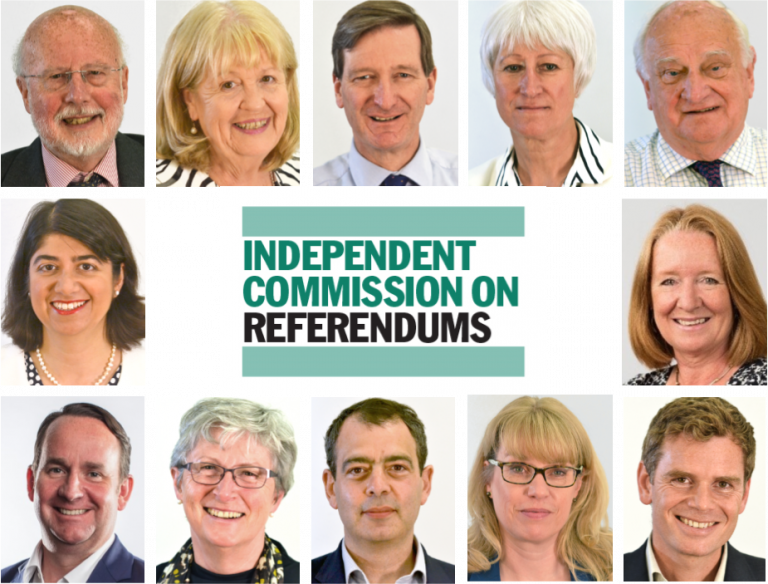Final report of the Constitution Unit's Independent Commission on Referendums launched
10 July 2018

The referendum process in the UK requires wholesale reform according to a report published today by the Independent Commission on Referendums.
Since 2000 five referendums have been held (beyond local referendums), in the UK as a whole, Scotland, Wales and the North East of England. In light of this experience, the Commission was set up by the Constitution Unit to review the role of referendums in British democracy and consider how the rules and practice could be improved. It comprises 12 distinguished members from across the political spectrum including former cabinet ministers, parliamentarians, senior media figures, and experts in democracy and elections.
Drawing on research carried out at the Constitution Unit, written evidence from a range of individuals and groups, and public seminars held in Belfast, Cardiff, Edinburgh and London, this report represents the most comprehensive review of referendums in over 20 years.
The detailed report sets out almost 70 conclusions and recommendations as to how referendums could best function in the future, all of which have been agreed unanimously.
Key findings include:
Embedding referendums in the process of democratic decision-making
- Referendums should be seen as part of wider processes of discussion and decision-making on key policy questions, not as 'quick-fix' solutions.
- Governments and political parties should avoid committing to holding referendums without first undertaking significant preparatory work engaging parliamentarians, civil society and members of the public.
- Wherever possible a referendum should be held after legislation setting out the proposed change has passed through the relevant parliament or assembly. Where this is not possible, detailed plans for change should be published and debated before the referendum. A process should be set out in advance requiring a further referendum if such plans are not published or are in the end not fulfilled.
Ensuring fairness in campaigns and improving transparency and accountability of campaigners
- Restrictions on government involvement in campaigning should be extended to cover the whole campaign period but restricted specifically to campaigning for one side or the other.
- Lead campaigners should be designated earlier, to limit any disadvantage to one side if there are competing applicants for designation.
- There should be greater transparency and accountability of campaigners, including a requirement for speedier spending returns and the application of a 'fit and proper' person test to board members of groups applying to be lead campaigners.
Empowering voters to be confident in their decisions
- Voters should be able to access the information they want easily.
- Publicly funded materials from campaigners should be labelled as such.
- Mechanisms for promoting high quality discussion during referendums should be 'bottom up'. Governments and parliaments should explore mechanisms for engaging citizens during the campaign period, including citizens' assemblies.
Updating existing regulations for online political campaigning
- A searchable database of online political advertising should be developed.
- The categories in campaigners' spending returns should be reviewed to provide greater transparency of online spending.
- Imprints should be required on digital campaign materials as on other forms of campaign materials.
- The Electoral Commission and Information Commissioner's Office should consider how they can work together to ensure the best possible regulation of online campaigning and campaign finance.
- An inquiry into the regulation of political advertising across all media should consider what form regulation should take and where current divergences of approach between media remain justified.
Sir Joseph Pilling, Chair of the Independent Commission on Referendums said:
"It is clear that referendums have become a key part of the democratic process - but a lot has changed over the past 20 years. The rules governing the role and conduct of referendums are outdated, not least because of the rise of the internet and social media. Our recommendations stem from three core points: first that referendums are best seen as co-existing alongside, rather than replacing, representative institutions; second, that they should be conducted in a way that is fair between the competing sides and effective in giving voters the information they want; and third, that the rules should keep up with rapid changes in online campaigning."
Seminar
There will be a seminar at 5.00PM on Wednesday 11 July at the Constitution Unit, 29-31 Tavistock Square, London WC1, at which the Commission's Chair, its Research Director and several of its members will discuss the recommendations and how they were reached, and consider what can be done to take the proposals forward.
 Close
Close


